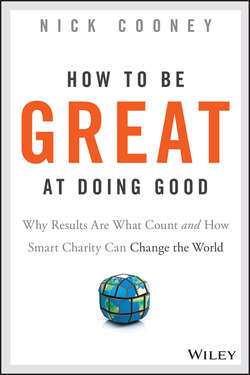Читать книгу How To Be Great At Doing Good - Cooney Nick - Страница 6
На сайте Литреса книга снята с продажи.
1
Why Charity?
The Goal of Charity
ОглавлениеAnd that brings us to the “Why?” question at hand: Why do we do charitable things? To be more specific, why do we donate our money to non-profits? Why do we volunteer? Why do the founders of non-profits start those organizations? Why do non-profit employees do the work they do?
If someone were to ask us, we would probably all answer the same way: we do charitable things because we want to make the world a better place. We want to do good. Why do I donate or volunteer? I want to stop the spread of HIV, end torture, and support marriage equality. Why do non-profit leaders and employees file into work every day? They want to reduce overpopulation, fight climate change, provide clean drinking water to the poor, promote gender equality, protect animals from cruelty, and so forth. Whatever the specific work we do may be, at the heart of it lies the same noble goal: to make the world a better place.
Society as a whole has defined charity in much the same way. Pop open your Webster's dictionary and you'll see charity defined as “generosity and helpfulness, especially toward the needy or suffering,” “aid given to those in need,” and “public provision for the relief of the needy” (Merriam-Webster, 2014).
Boiling that dictionary definition and our common-sense understanding down, we see that charity has two key elements. First, charity is something we do to help others. It's not about satisfying our own desires. Second, the goal of charity is to reduce the suffering of those in need.
Not every action taken under the banner of charity has that exact goal. For example, some charitable work is not meant to help the needy per se, but rather to enrich the lives of those who are doing okay. Theaters, after-school programs, and Girl Scout troops do not exist to solve an acute problem, but rather to improve the lives of those they reach. Of course, improving well-being and helping those in need are two sides of the same coin. So perhaps a better way to define the goal of charity would be this: the goal of charity is to reduce the suffering and increase the well-being of others. To put that a little more simply, the goal of charity is to make the world a better place.
That definition still would not encompass every act that is dubbed “charity” in our society. Some religious congregants may donate to their church, not to make the world a better place, but because donating is what the Bible demands of them to reach heaven. Some environmentalists may donate to protect an old-growth tree, even though that tree can't suffer or experience happiness. Some people donate to non-profits, not because they think doing so will improve the world, but because doing so will help protect their own ability to hunt or own handguns.
While the IRS regards donations like these as charitable giving, they are outside the scope of both the dictionary definition of charity and what most of us consider true charity. When we think deep down about it, the goal of charity is not to benefit ourselves. The goal is to make the world a better place, one with less misery and more well-being.
Of course, a desire to help others isn't the only thing that drives the charitable decisions we make. We may have signed up for a charity run both because it raised money for a good cause and because it helped us get in better shape. We may have bought tickets to a fundraising gala both because we support the cause and because it was an opportunity to socialize with friends. While personal benefits like these can sometimes give us an added incentive to do good, at the end of the day our main goal is still an altruistic one. We really do want to make the world a better place.
